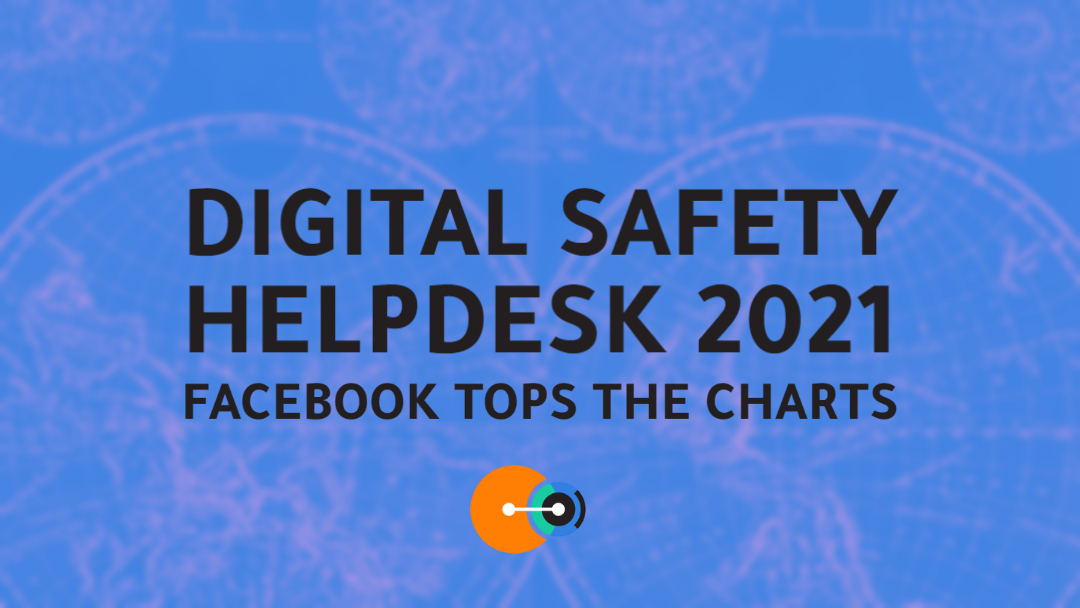What does it mean when the majority of reported digital security incidents during 2021 took place on Facebook? For one, the growing number of wrongfully suspended accounts and removed content points to sloppy moderation practices on the platform, especially in regards to Arabic content. At the same time, errors in these practices indicate a deeper, ideological problem in drafting “community guidelines” that end up silencing marginalized groups and individuals online. This is only one example of numerous incidents that were reported to our Digital Safety Helpdesk.
SMEX launched the Digital Safety Helpdesk in 2019 to offer technical support to activists, journalists, and human rights organizations facing a range of cybersecurity incidents in Lebanon and a number of Arabic-speaking countries. In 2021, our team has responded to more than 100 cases related to online censorship, harassment, and unfair content takedown on social media.
The below overview of the cases handled between January and December 2021, provides valuable insights into the kinds of online threats encountered by activists, human rights defenders, lawyers, journalists, and CSOs in the region, and more specifically, in Lebanon. Understanding where, when and how often they occur will allow us, as a community, to map out current threats, respond to specific patterns, and counter potential risks at both the technical and policy levels.
Incidents can be reported to the Digital Safety Helpdesk via Email, Signal, or Whatsapp. The Helpdesk’s internal incident-handling system is designed to filter cases by urgency and capacity. Our incident handlers are available between 9:00 AM and 12:00 AM everyday, including weekends.
In 2021, we received 79.9% of the incidents via Email, 18.6% on Whatsapp, and only 1.5% were over Signal. The high rate of communication via email is linked to the fact that prior to July 2021, Whatsapp as a channel was not yet available for reporting. The low percentage of incidents received via Signal proves that only few people in our region use Signal for secure instant messaging.
(Note: All collected data is sanitized and anonymized before analysis.)
Facebook tops the chart
In terms of platforms, 57 incidents, including account and/or activity suspension took place on Facebook, while 19 incidents took place on Twitter and 27 on Instagram. The high rate of cases on Facebook can be attributed to its widespread use in the Arabic-speaking region, followed by Whatsapp.
These numbers show the weaknesses and loopholes in the community guidelines that lead to unfair content moderation on the platform. The wave of censorship that swept across Facebook and Instagram during the attacks on Sheikh Jarrah in April 2021, where hundreds of pro-Palestinian content and accounts were taken down, illustrates Meta’s faulty moderation practices and its inherent bias against specific narratives.
In the last year, around 50 incidents were escalated to the companies directly through the Helpdesk to highlight the unjust suspension of some accounts and cases of unjustified content takedown.
Two types of security incidents
We notice two main types of incidents that take place on the Digital Safety Helpdesk. The first (humanitarian) type is linked to the holder of the account, where individuals report threats of sextortion, cyberbullying, and online harassment, among others. In 2022, and as more people shift to the digital sphere, we expect that these numbers will remain on the rise.
The second type of reports is related to technical issues and is linked to accounts directly. Incidents include hacked or stolen accounts, as well as suspended accounts and activities. Out of the 67 technical cases, 70% were escalated to the relevant companies. These findings highlight a rise in oppression of free speech in numerous countries in our region.
What is the gender balance or imbalance in this case?
Finally, we notice that 51.6% of cases are reported by male users, compared to 36.3% by females. It is important to mention that out of all the cases reported, 70% are related to online harassment, sextortion, hate speech and cyberbullying towards women.
The findings of the Digital Safety Helpdesk reveal the many vulnerabilities that users from Arabic-speaking countries face online. Be it technical or policy-related, much more work still needs to be undertaken to create safer, more resilient online civic spaces.
Moving forward, SMEX will be expanding its efforts to help build digital resilience in individuals and CSOs in Lebanon and in the region, primarily through sharing digital security tips, conducting digital wellbeing checks, providing digital security training sessions and more. In addition, SMEX will further develop its Forensic Audit capacities to better support journalists and human rights defenders who have been targets of spyware. Lastly, SMEX will continue its advocacy work for more just policies on social media platforms, ones that take into consideration the cultural, linguistic, and historical nuances of the Arabic-speaking region.
Digital Safety Helpdesk contact info:
- Signal: +961 81 633 133
- Email: helpdesk@smex.org
- WhatsApp: +961 81 633 133



